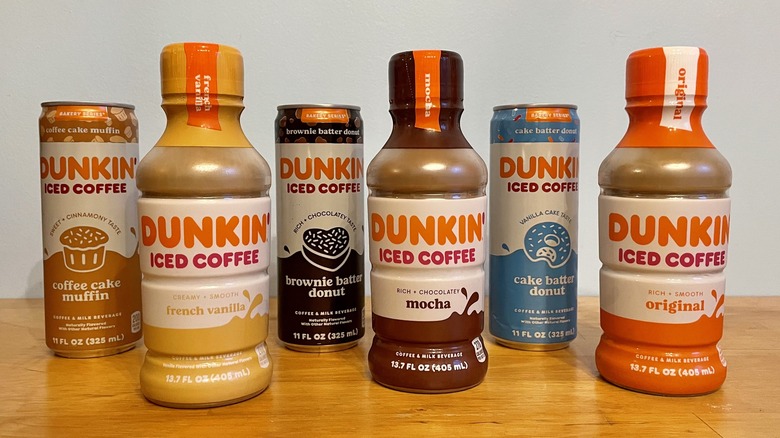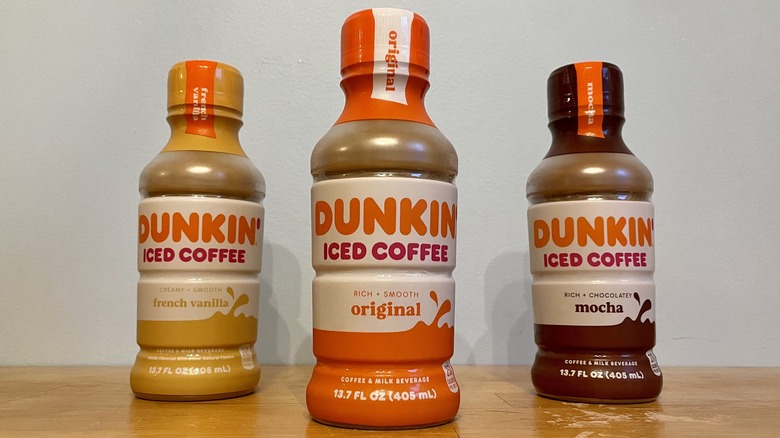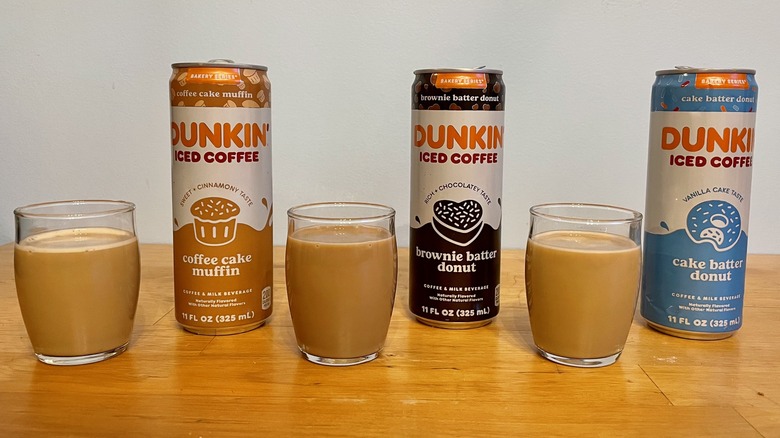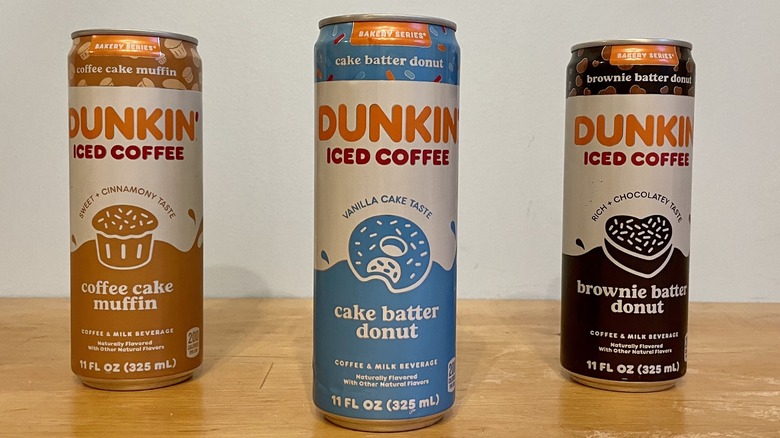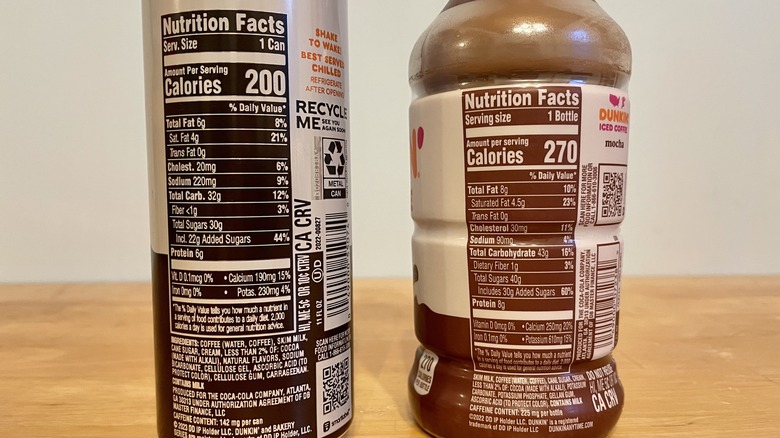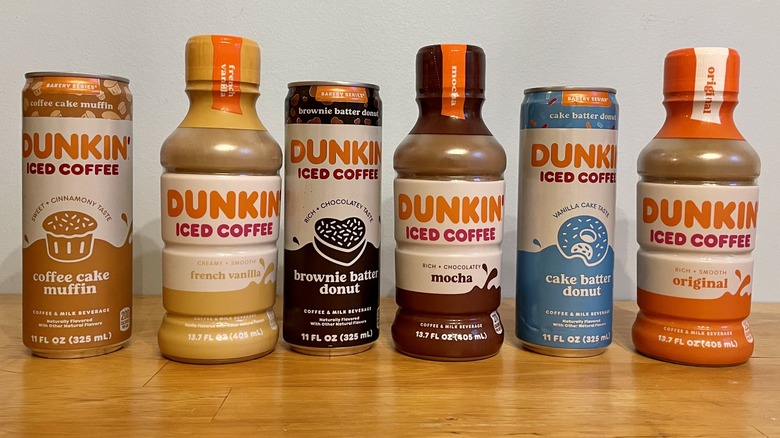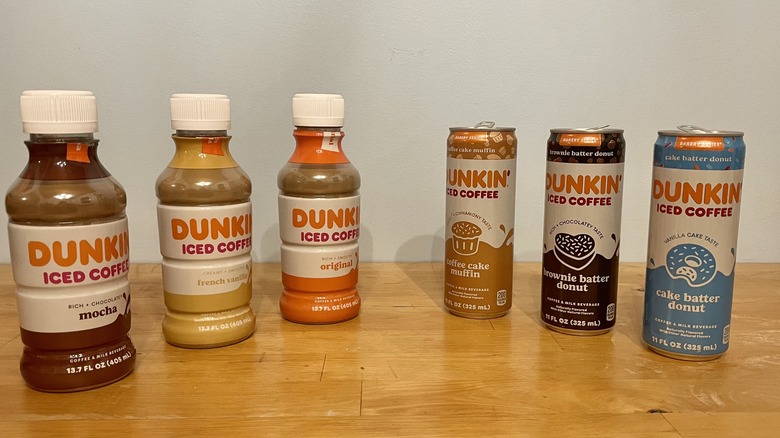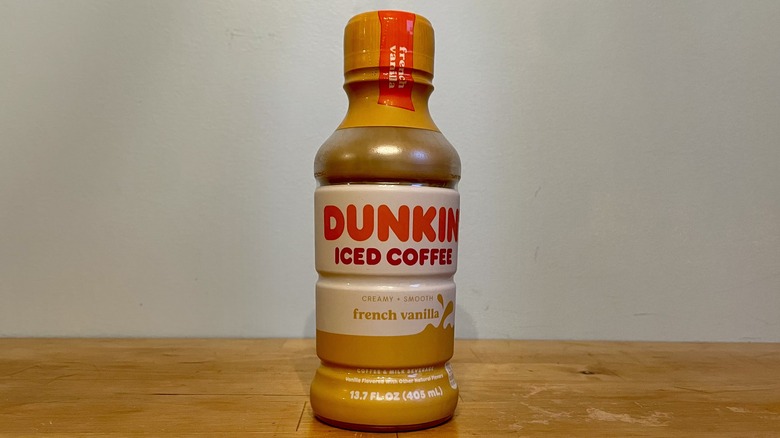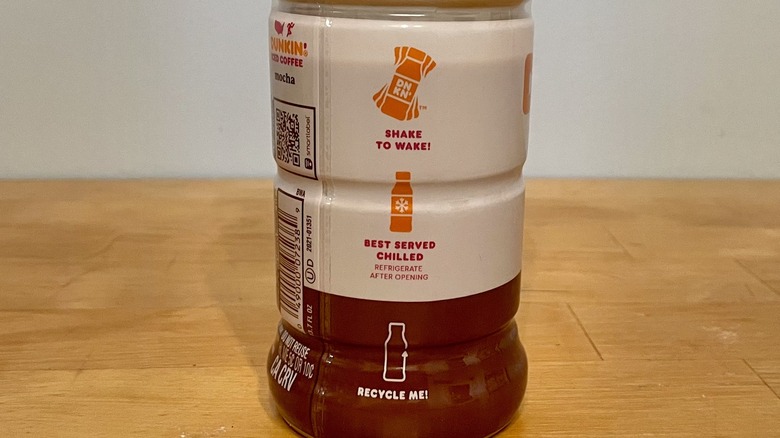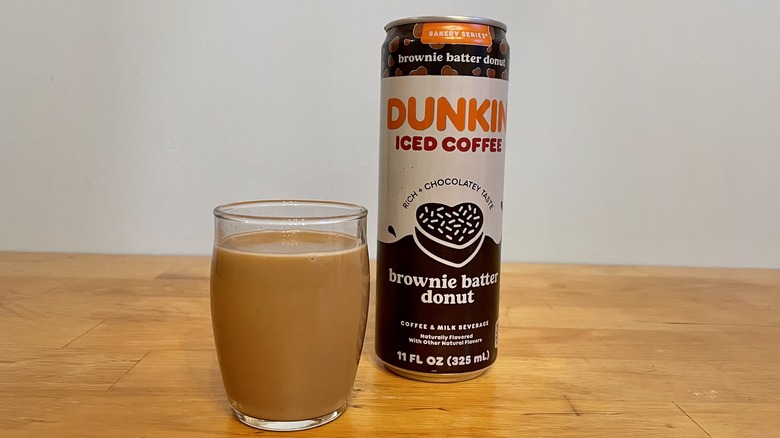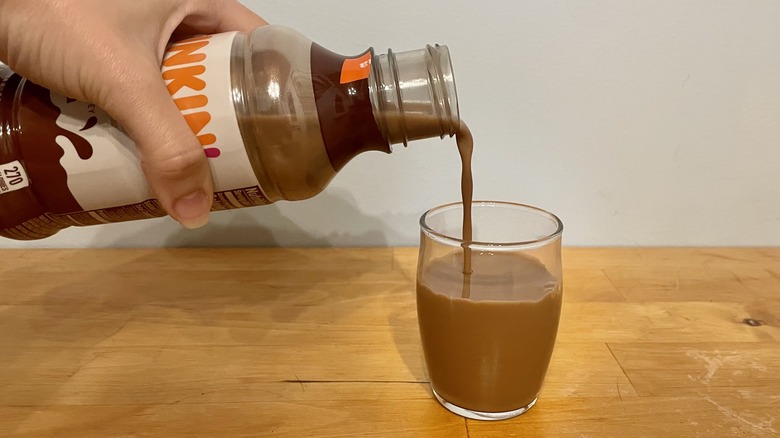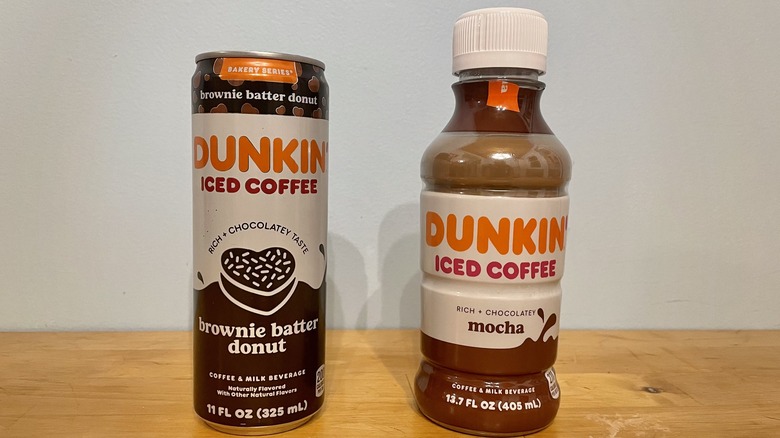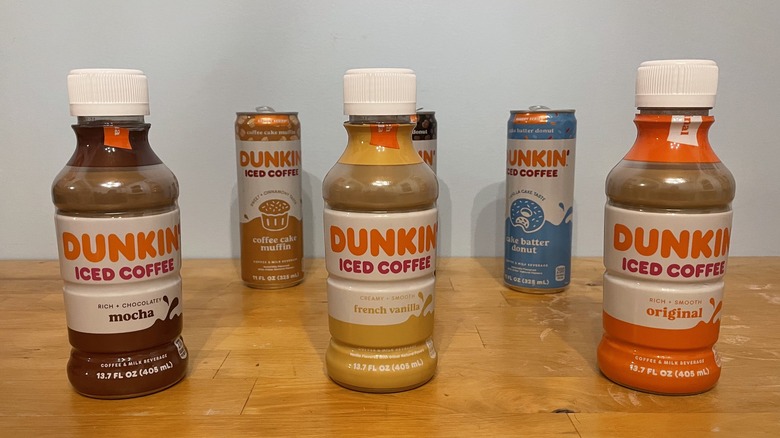Canned Dunkin' Coffee Vs Bottled: Which Tastes Better?
In 2018, when Dunkin' Donuts announced it was rebranding as simply Dunkin', the idea was to promote the foods and drinks offered beyond its donuts, focusing heavily on Dunkin' coffee. Since then, Dunkin' has continued to expand its coffee offerings in store and has come up with not one, but two lines of coffee beverages outside of stores.
Dunkin' is clearly going after some of the more coffee-focused competitors, trying to place itself squarely in the prefab coffee market. The company now has two lines of bottled iced coffee: one in plastic bottles and one in cans. Bottled coffee is not new. The first appearance was UCC canned coffee, which premiered in the Japanese market in 1969. While the idea was revolutionary at the time, you can't walk down the aisle of a grocery store these days without finding a wide selection of ready-to-drink coffee products. Since Dunkin' decided that one line of iced coffee wasn't enough, we decided it was time to find out what precisely the differences were and which line offered the better coffee drink.
What is Dunkin' bottled?
Dunkin' bottled iced coffee first premiered in 2017, back when the company was still Dunkin' Donuts. The original line offered four flavors: mocha, original, French vanilla, and espresso, the latter of which appears to have been discontinued. Now, while other flavors have come and gone, the mocha, original, and French vanilla varieties remain the core three beverages.
The drinks are produced by the Coca-Cola company and are made using Arabica coffee, milk, cream, and sugar to Dunkin's specifications. This is the first line of prefab ready-to-consume coffee drinks produced by Dunkin', but it is by no means the last. Each bottle is plastic, with a different colored label to indicate which flavor it contains. They are 13.7 ounces each, which means they are slightly smaller than the small sized 16-ounce cups for cold drinks that you can get in the Dunkin' store, though the in-store drinks do include ice cubes. The bottles feels like an incredibly specific size. The drinks are not labeled as lattes, but they are milk-based coffee drinks.
What is Dunkin' canned?
Dunkin' canned iced coffee is the newest addition to the prefab coffee drink world. Dunkin' canned iced coffee premiered in February 2023. The canned versions of the drinks are also made with the Coca-Cola company. This time, Dunkin' chose to package its products in sleek, tall cans. As with Dunkin' bottled, Dunkin' canned is available in three flavors as part of the brand's Bakery Series. These are unsurprisingly dessert-type flavors: coffee cake muffin, cake batter donut, and brownie batter donut.
Each can of Dunkin' Bakery Series iced coffees is filled with 11 ounces of the coffee drink, which makes them even smaller than a standard small at Dunkin', which is 16 ounces for the cold drinks. Like the Dunkin' bottled, these drinks offer colorful outsides that correspond with the flavor within. These are also sweet and milky coffee drinks. Before drinking, each can needs to be chilled and shaken well to provide the best drinking experience.
Differences in ingredients
As you may have noticed from the descriptions, the two lines of ready-to-drink Dunkin' iced coffees have shockingly similar ingredient lists. Both are Arabica coffee blends made with skim milk, cane sugar, and cream. Further investigation showed that there are some small differences, though.
Both varieties contain some additives. The Dunkin' bottled varieties have potassium carbonate, potassium phosphate, ascorbic acid (to protect color), and gellan gum. The original and French vanilla flavors contain carrageenan, which is a type of red seaweed commonly used as a thickening agent. The French vanilla also lists natural flavors. The mocha variety contains cocoa.
The Dunkin' canned varieties, on the other hand, all have natural flavors, sodium bicarbonate, cellulose gel, ascorbic acid, cellulose gum, and carrageenan. Once again, the brownie batter donut flavor also has cocoa in it. While there are some minor differences in composition, there is nothing that really sets these two lines apart other than flavor.
Nutrition comparison
Since the Dunkin' bottles are 2.7 ounces bigger, it is not surprising they are higher in total calories as well as in fat and sugar content. Interestingly, even though the Dunkin' canned drink flavors are all based on desserts, they are disproportionately lower in sugar and calories per ounce when compared to the bottled versions. The bottles each have 39-40 grams of sugar, whereas the cans have 30 grams of sugar. Dunkin' bottles also have between 250 calories and 270 calories per bottle, depending on the flavor, while each canned drink has 200 calories.
The other major nutritional difference is in caffeine content. Dunkin' canned drinks are lower in caffeine, ranging from 135-142 milligrams per container, whereas Dunkin' bottled drinks contain 196-225 milligrams. For context, a standard small cup of black coffee from Dunkin' has 180 milligrams of caffeine, and an iced coffee has about 198 milligrams, putting both more in line with Dunkin' bottled drinks.
For drinks that are so similar in terms of ingredients and size, it is surprising to see that there are some substantial differences in the nutrition.
Flavor differences
Aside from the packing, probably the most noticeable difference between the Dunkin' canned and Dunkin' bottled is the flavors. Dunkin' bottled is playing it safe with the standard chocolate and vanilla. It is the cans that really came in strong with the out-there flavor names. Not only are each of the canned flavors different desserts, but they all feel like they are two desserts smushed together. Brownie batter donut is both a brownie and a donut, and coffee cake muffin is both a coffee cake and a muffin.
While Dunkin' bottled focuses on the "rich" and "smooth" taste, the Dunkin' canned varieties try to highlight what exactly those flavors mean. The coffee cake muffin is sweet and cinnamony, the brownie batter is chocolatey, and the cake batter is vanilla-tasting. When you put the flavors in those terms, it takes the edge off the outlandish flavors.
That being said, in a way, the dessert flavors are more on-brand. Despite changing its name to Dunkin' in a bid to promote coffee, Dunkin' is still predominantly known for its donuts and baked goods. At least these flavors acknowledge where the company started.
Where to get them
Considering that Dunkin' bottled has been around far longer than Dunkin' canned, it is not entirely surprising that the bottled drinks are much easier to find. Dunkin' canned drinks are available at some retail outlets and convenience stores, but from our experience, they just are not as widely available. We were able to get them at Walmart, but just one Target in our area carried them.
This is in stark contrast to Dunkin' bottles, which were at every Target location, Walmart, local grocery stores, CVS, and other smaller convenience stores. They were simply more straightforward to find. Again, this is likely due to the relative newness of Dunkin' canned, but there is no denying that if we are in search of a Dunkin' coffee product, it would be nice not to have to go out of our way just to find a dessert-centered flavor.
We would be curious to see if availability expands for the Dunkin' canned drinks down the road, but as it stands, they are just not that accessible.
Price differences
There is a slight price difference between Dunkin' canned and Dunkin' bottled drinks. Dunkin' canned cost us $2.48 each, and Dunkin' bottled cost $2.78 apiece, a difference of $0.30. While that likely will not break the bank for most, it is something to be mindful of.
Now, it is important to remember that Dunkin' canned is also a few ounces smaller than Dunkin' bottled. So, if we do the price per ounce instead of per container, the price difference actually switches. Per ounce, Dunkin' canned costs roughly $0.23. Dunkin' bottled costs about $0.20 per ounce. That means per ounce, Dunkin' bottled is actually cheaper than Dunkin' canned. While the difference in price is even smaller here, it is interesting to see how that price shift worked out. We cannot decide for consumers which is more important, the price per ounce or the price overall. But it is worth considering when deciding which drink to purchase.
Storage requirements
Both the canned and bottled drinks have the same storage requirements. Both are able to be stored at room temperature but are best when consumed cold, and both need to be shaken before drinking. Once the bottle or can has been opened, any leftovers must be refrigerated.
What is interesting, though, is that the Dunkin' canned drinks appear to not last as long as the Dunkin' bottled drinks. The Dunkin' bottled drinks we got all had expiration dates between December 2023 and April 2024. The Dunkin' canned drinks all expired in December 2023. This could be a difference in bottling time. But it would also indicate that perhaps the Dunkin' canned is not selling as quickly as the Dunkin' bottled. Both are sold in individual containers, which means the consumer is not expected to keep them for very long. However, considering all of the Dunkin' canned products are expected to expire seven weeks after purchase, we have to wonder how long they had already been on the shelf.
Looks can be deceiving
In terms of appearance, the biggest difference between Dunkin' canned and Dunkin' bottled is the packaging. Dunkin' bottles come in plastic bottles with a narrow lip, twist-off cap, and three indented rings. The Dunkin' cans feature a streamlined, sleek, tall can with a pop top. Dunkin' bottled gets points for being resealable.
Dunkin' bottles use the signature colors of the brand, featuring brown, orange, and tan labels for each of the three flavors. The bottles are nearly identical, with the only major difference being the color and some minor differences in wording around the flavor. Dunkin' cans, on the other hand, are more whimsical in their design. Each bottle is color-coded according to flavor, but these are brown, beige, and blue, breaking away from the Dunkin' orange color. Each can also has a different graphic on it representing the different treat the flavor is based on. Brownie batter donut has a heart-shaped brownie, coffee cake muffin has a muffin, and cake batter donut has a sprinkle-covered donut. Additionally, at the top, each can has a colored banner with the shape — brownie hearts, muffins, and sprinkles– scattered on it.
All of the coffee drinks themselves appeared similar in color and clarity. All were milky, with a light brown color. The outliers were the mocha and brownie batter donut varieties, which both had a darker hue.
Smell and texture comparison
These drinks are incredibly similar, but what is most striking is the difference in smell. Even between the two chocolate flavors, once the bottles and cans are open, you can instantly smell the difference. For example, the bottled Dunkin' mocha flavor has a far greater cocoa smell than the canned brownie batter donut one. The canned ones still have distinct aromas, but they are not quite as potent as the bottled ones.
The cake batter donut canned Dunkin' drink almost smells floral. While, yes, vanilla is technically a flower, we mean more on the rose side. It isn't necessarily unpleasant, but it is not what we anticipated.
As textures go, they are uniform among the canned and bottled beverages. The bottled ones are ever so slightly thicker, but in general, both drinks are fairly thin and, dare we say, watery. This is likely due to the use of skim milk across all the drinks. We have to wonder why they didn't just use 2% or whole milk to create a more luscious mouthfeel.
Where's the coffee?
Both bottled and canned beverages offered a cocoa and a vanilla flavor. This made doing the comparison fairly easy. And there was a clear winner. The cocoa was stronger in the bottled drink, which gave it a pleasant balance to the sugar. What was interesting was that even though the bottled drink had more sugar, the canned drink tasted sweeter, likely because it didn't have enough cocoa to balance it out.
The vanilla bottle was also better than the canned one. The cake batter donut canned Dunkin' drink was overpoweringly vanilla flavored. It simply was not pleasant. The original bottled iced coffee, while nothing to write home about, was sweet and drinkable, with not much else. The canned coffee cake muffin was slightly cinnamony and sweet, which we guess is similar to a coffee cake.
What we found most interesting, though, was that none had a particularly pronounced coffee flavor. The coffee felt more like an afterthought than the main flavor. The bottled drinks seemed slightly higher in coffee flavor, but not by much.
The clear winner
None of the canned or bottled Dunkin' iced coffee drinks blew us away. That being said, for us, there is a clear winner: the bottled beverages. The bottled drinks are cheaper per ounce, they are easier to find, and they just flat-out taste better. They also have a lid, so you can travel more easily with a bottle.
The canned drinks do have the nicer packaging, but they are watery and overall lackluster as the flavors go. They are trying to do too much. When you promise consumers coffee cake muffins and brownie batter donuts, you can't just deliver some cinnamon and cocoa powder. The bottled Dunkin' keeps it simple and delivers on the promises made on the labels. The bottles may not be as flashy as the cans, but they do exactly what they need to.
Additionally, while we were not over the moon with any flavors, we found the cake batter donut canned Dunkin' particularly undrinkable. At least all the Dunkin' bottled drinks were acceptable. The bottled varieties have also had the chance to work out any kinks. The canned Bakery Series of drinks is new; it is normal to have some growing pains, but while the company works those pains out, we will stick with bottled beverages.
